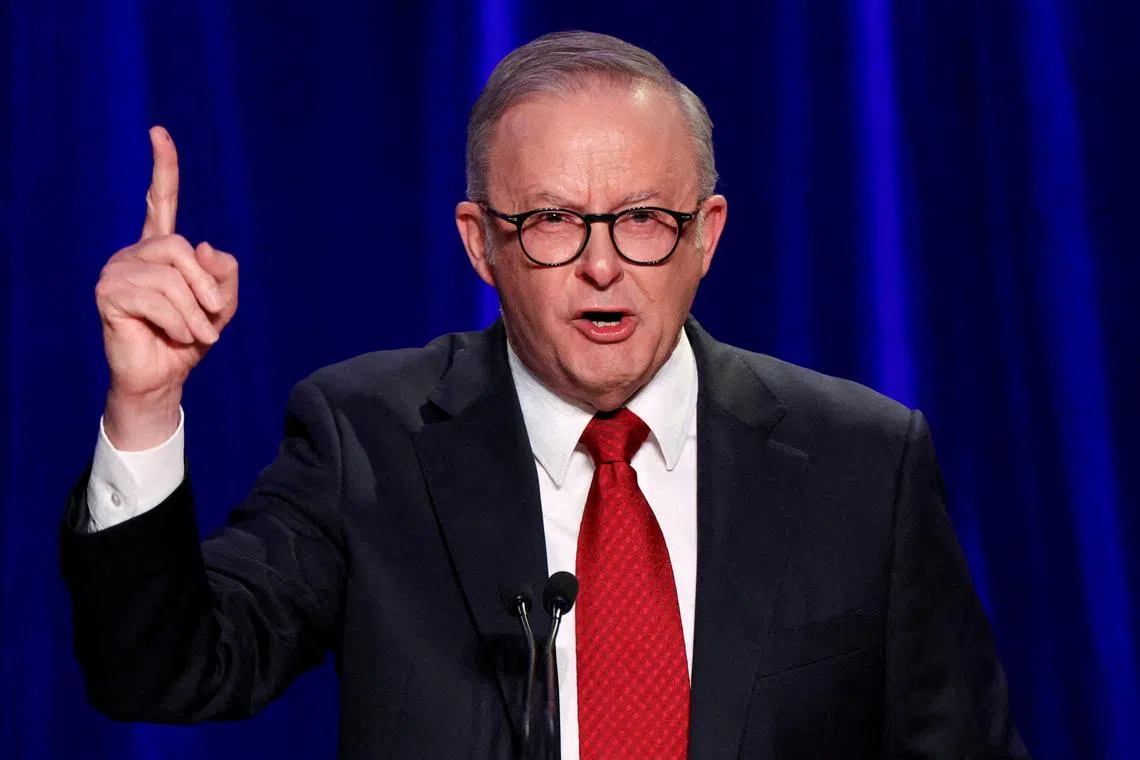Australia-Israel row on Palestinian statehood shows mood shift, Canberra unafraid of upsetting ally
Sign up now: Get ST's newsletters delivered to your inbox

Israeli Prime Minister Benjamin Netanyahu had been launching personal attacks on Australia’s Prime Minister Anthony Albanese (pictured).
PHOTO: REUTERS
Follow topic:
SYDNEY – Australia’s decision to recognise a Palestinian state came after the government sensed a major shift in the domestic mood over the war in Gaza, and showed that Canberra was unafraid of upsetting Israel, historically one of its staunchest allies.
The Aug 11 announcement came days after tens of thousands of people marched across Sydney’s iconic Harbour Bridge, calling for peace and aid deliveries to Gaza, where Israel began an offensive nearly two years ago after the Hamas militant group launched a deadly cross-border attack.
The health authorities in Gaza say at least 60,000 Palestinians have been killed
Dr Martin Kear, an academic at the University of Sydney specialising in the Israeli-Palestinian conflict, said: “It just became politically unpalatable to be continuing to defend Israel and lay all the blame at the feet of Hamas.”
The decision has strained relations between Israel and Australia to a degree not seen in decades.
Senior politicians in both countries have traded barbs – with Israeli Prime Minister Benjamin Netanyahu launching personal attacks on Australia’s Prime Minister Anthony Albanese – and the visas of Australian diplomats working in the West Bank have been revoked. An Israeli lawmaker was barred from entering Australia.
A leading Jewish group in Australia has called for calm, while offering a rare rebuke of Mr Netanyahu. Some Jews in Australia say the tension makes them feel unsafe, after a spate of anti-Semitic attacks in the country over the last year.
Opinion polling in Australia about the Gaza conflict – a divisive issue in a country with large Muslim and Jewish minorities – now indicates increasing sympathy towards the Palestinian cause.
August polling by DemosAU showed 45 per cent supported Australia recognising a Palestinian state before a negotiated peace deal, with 23 per cent opposed. Support was up from 35 per cent a year previously.
Public sympathy for Israel in Australia began to “rapidly erode once the apocalyptic spectre of famine rode into Gaza”, the Sydney Morning Herald, one of the country’s leading newspapers, said in an editorial in August.
The images from Gaza have also hardened the resolve of lawmakers, said Dr Charles Miller, a lecturer in international relations at the Australian National University.
“I think they have changed an awful lot of minds amongst policymakers in Australia, as they have in other countries,” he said.
Jewish unease
The political fallout has alarmed the Executive Council of Australian Jewry, an umbrella group organisation for more than 200 Jewish organisations, that sent letters to Mr Albanese and Mr Netanyahu on Aug 20, urging them to de-escalate tensions.
“If things need to be said publicly, they should be said using measured and seemly language befitting national leaders,” the letters read.
Australia has been grappling with anti-Semitic attacks on synagogues, buildings and cars since the beginning of the Israel-Gaza war, and some Jews worry heightened tensions between Australia and Israel could fuel more attacks.
“When the temperature of the political discourse in the media is so focused on criticising Israel, there will be ramifications for the local Jewish community, and that’s something that we need to reflect on,” said Mr Eli Feldman, the rabbi at Newtown Synagogue in Sydney, which was defaced with anti-Semitic graffiti in January.
Historic ally
Australia was an early supporter of the creation of a Jewish state, and has long advocated for Israel in international disputes, though both main political parties back a two-state solution in principle.
While Mr Albanese had personally long supported a Palestinian state, until now, his political pragmatism had made him wary of backing official recognition.
That changed with the shift in the public mood while his landslide victory in May’s general election reduced the risk of domestic pushback, said Dr Jessica Genauer, an academic at Flinders University specialising in international conflict.
Key allies Britain, France and Canada, all said they would recognise a Palestinian state in the weeks before Australia, which also made Mr Albanese’s job easier, analysts said.
“They don’t want to lead on carving new pathways in terms of their policies on this, but on the other hand, they don’t want to be left behind by key allies around the world,” Dr Genauer said.
“Albanese is still a pragmatic and cautious person by nature.”
Mr Netanyahu has repeatedly attacked Mr Albanese in a series of interviews and social media posts since Aug 11, calling the Australia leader “weak” and accusing him of “betraying” Israel.
While Mr Albanese has played down the feud, Mr Netanyahu shows no sign of backing down. He kept up the rhetoric with an interview with Sky News Australia that aired late on Aug 21.
“I’m sure he has a reputable record as a public servant, but I think his record is forever tarnished by the weakness that he showed in the face of these Hamas terrorist monsters,” the Israeli leader said. REUTERS

